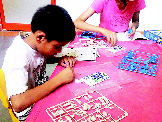Kavya, 6, can read like a 15-year old. She can also comprehend the words in a newspaper. Her parents keep her away from it, as they feel it doesn’t have the appropriate content for her age. People around Kavya are ‘tired’ of her incessant questioning. She doesn’t have many friends, because “children of her age say that she always tries to be over-smart,” says Kavya’s mother, Madhuri. Undoubtedly, her advanced vocabulary has made her unpopular. While other children in her class (KG) are coming to terms with the alphabet, she can read complete sentences. Thus she refuses to learn mere alphabets, and her teacher has concluded that Kamini is a slow learner and an undisciplined child. However, when Kamini’s IQ level is tested, it is found more than average. Kamini is now considered a “gifted” child.



Like Kamini, there are 20 million ‘gifted’ children in our country. According to a research the City should alone have almost 5,000 ‘gifted’ children. While these figures are startling, many people are not even aware of the term. There is also widespread misunderstanding that ‘gifted’ children are always high achievers. A City-based expert, Dr. Inderbir Sandhu says, “Gifted children have quite different needs. The social and emotional development of a ‘gifted’ child is not at the same level as his/her intellectual development. That is why they need different treatment and care. If their abilities are not utilised properly, they can end up performing like an average child – or probably below average.”
Most of the schools in the City have designed a special curriculum for the intellectually challenged. They, indeed, have special instructors for them. But, unlike the US and UK, in India students at the other end of the spectrum – a small percentage of ‘gifted’ minds – are often neglected. “Just like an autistic child or a dyslexic child, a ‘gifted’ child needs help. When a range of educational interventions is available for the ‘special’ child, why not for a ‘gifted’ child – who also comes in the same category,” says Dr. Sandhu, who holds a PhD in Psychology (Gifted Education) from the University of Cambridge, UK. Usha Pandit, a Mumbai-based gifted education expert, also feels the same. “The main reason for identifying ‘gifted’ children is to enable them to obtain a better, more suitable education. It is important to realise that they are special kids who are highly intelligent,” says Usha.
How to identify a gifted child
Unfortunately, there is no one method to identify a ‘gifted’ child. The ‘gifted’ children are often misdiagnosed (with disorders like ADHD). It is important to spread awareness about ‘gifted’ education, so that parents can detect giftedness at an early age. Giftedness can be detected in infants too. As Dr. Sandhu informs, “If your child is extremely alert, needs less sleep than other babies, begin to mimic sound very early, and tends to be exceptionally sensitive to sounds, smells, textures, and tastes, he/she could be a ‘gifted’ child.”
Navita Shastri, a resident of DLF Phase IV says, “My daughter started colouring at the age of 1. She woud get frustrated even if she only slightly drew outside the given lines. Also, she was very sensitive to loud noises – such as buzzing or toilet flushing. Even the seams on her socks used to make her angry. My uncle, who came from the US, where ‘gifted’ education is quite a popular concept, informed us that this type of frustration and ‘over- excelling’ is part of the perfectionist characteristic of a ‘gifted’ child. Later, tests also revealed the same. I am glad that simple acts of frustration revealed her giftedness at the right age.”
‘Experts also say that some signs can be an endless questioning or a sustained interest in learning – where the child puts in long hours on his/her own, on general subjects. They can also show unusual imagination, an appetite for knowledge through any source. “Most of the ‘gifted’ children read a lot. Unlike other children, a ‘gifted’ child would neatly turn the pages of a book, even at the age of 1,” says Dr. Sandhu.
Using tests: Although there are a number of IQ tests to detect giftedness among children, you can’t rely upon a single test. According to experts, full scale IQ scores between 90 and 109 are considered average, 110 to 119 is higher than average, 120 to 129 is superior, and 130+ is considered extremely superior. Individuals with high IQs are more likely to show an uneven ability profile – high in one or two abilities, average or below average in the others. Usha, however, doesn’t advise parents to rely completely on IQ tests. “There have been cases where a child’s exceptional ability in one domain could not be explained by an IQ test alone. It is therefore important for parents to get in touch with an expert in gifted education,” says Usha.
Dr. Sandhu suggests that all parents know about the concept of giftedness, so that they can identify it in children. “In India, people generally associate high grades with giftedness. Students are recognised for neat work and rote learning, rather than for divergent or critical thinking. Thus people ignore children who underperform or misbehave. However, they could also be gifted children,” says Dr. Sandhu.
Challenges
Raising a ‘gifted’ child is a challenge. Dr. Gupta, who runs an NGO for ‘gifted’ children in Faridabad, “Genius Minds”, gives an example of a 5-year-old gifted child who went into depression after watching a video of the tsunami affected areas in Japan. “He stopped talking to his family members. Due to his high intelligence level, he could feel the plight of the victims. His parents left him at an NGO that deals with mentally retarded children. When this child was brought to us, we conducted IQ tests, and after a month-long observation we realised that he was a ‘gifted’ child. Today, the child is just 11 years old and studies in Class X. He is one of the best performers in his class.” says Dr. Gupta, who plans to set up an NGO for ‘gifted’ children in the City soon.
‘Gifted’ children don’t get their dues in our country. Research has also shown that the long term effects of ‘unrecognised giftedness’ are mostly negative – such as feelings of frustration, low self-esteem, isolation, diffidence, disconnection with education and learning, negative social behaviour, and unfulfilled potential.
Way out
Most of the schools in the City are not equipped to deal with gifted children. “As the numbers in the classroom, and curriculum pressures, often make it difficult to pay attention to the ‘gifted’ child, after-school enrichment programmes must be organised to meet such special needs. These after-school programmes can be run by specialists, or teachers trained in education for ‘gifted’ children,” suggests Dr. Gupta.
Another important step, pointed out by Dr. Sandhu, is to train teachers. “Children ask many questions daily, and are often ignored by their teachers, as they are busy finishing the syllabi. As a result, ‘gifted’ children are often neglected. Some teachers describe such students as those with ‘behavioural problems.’ This shows the lack of experience and knowledge of our teachers,” says Dr. Sandhu.
Last year, during a science class, Mrs. Akram, who takes tuition classes in Sector 56, asked students to measure the rate of evaporation of a swimming pool. “A student asked an unexpected question – ‘Ma’am, what if it rains?’ I took him to an expert, and came to know that he was a ‘gifted’ child,” says Mrs. Akram. Today, at the age of 12, the child is a National champion in chess.
The contribution of teachers is, therefore, extremely important. “Teachers should acknowledge this ability, instead of asking the students to follow the same rote methods, which might kill the child’s creativity forever, and hit his/her confidence badly,” says the Director of Excelsior American School, Shalini Nambiar, who has been working hard to promote the concept of ‘giftedness’ in the City.
Although a lot of parents feel proud to have ‘gifted’ children, they have to understand that giftedness comes with both distinction and discrimination. ‘Gifted’ children must be nurtured properly, or their high intelligence level and hyper active nature can easily result in their inculcating negative traits. They might end up becoming mere underachievers, mischief-makers or dropouts.
An exclusive school for gifted children
Srinivasan, founder of Gifted Education and Research Foundation (GEAR), Bangalore suggests we have an exclusive school for ‘gifted’ education in the City. He is also the founder of Rotary Public School here. At Rotary, they try and motivate children to realize their gifts and talents, and also are developing teaching-talents to recognise and nurture giftedness.
Read More...